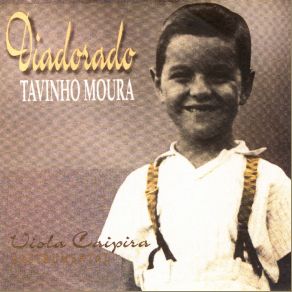Diadorado
Download links and information about Diadorado by Tavinho Moura. This album was released in 1995 and it belongs to World Music, Latin genres. It contains 15 tracks with total duration of 33:55 minutes.

|
|
|---|---|
| Artist: | Tavinho Moura |
| Release date: | 1995 |
| Genre: | World Music, Latin |
| Tracks: | 15 |
| Duration: | 33:55 |
| Buy it NOW at: | |
| Buy on iTunes $9.99 | |
Tracks
[Edit]| No. | Title | Length |
|---|---|---|
| 1. | Diadorado | 2:51 |
| 2. | Marcha De Quadrilha | 1:22 |
| 3. | Capitão Do Mato | 3:35 |
| 4. | Pegada Da Onça | 1:36 |
| 5. | Inhuma Pantaneira | 2:43 |
| 6. | Estrela Alpacita | 2:15 |
| 7. | Pé Vermelho | 2:22 |
| 8. | Rosário De Mariá | 2:19 |
| 9. | Rio Abaixo | 1:45 |
| 10. | Romãozinho | 2:34 |
| 11. | Luduvina | 2:04 |
| 12. | Corpo Fechado | 1:39 |
| 13. | Manoel Por Fora Violeiro Por Dentro | 1:45 |
| 14. | Tinhosa | 1:06 |
| 15. | Folia Sorriso De Nuvens | 3:59 |
Details
[Edit]Brazil has a vast cultural diversity and an ample spectrum of musical styles — after all, it's a country with over 8,500,000 square kilometers of area, in which fit several diverse geographic regions, each one with its own folklore. (In this case, it's the rich caipira (redneck) tradition of Minas Gerais.) More known by the magnificent baroque sculptures by Aleijadinho, the monumental cantatas and masses also from the baroque period, and, more recently, by the urban music of Milton Nascimento, Wagner Tiso, and the people from Clube da Esquina, Minas also has its own genuine caipira folklore, composed of "causos" (stories) told by the light of lampoons and bonfires, and music. As almost all folkloric music, the mineira regional music is deeply influenced by religion, with its own dances devised for specific saints on specific days. As effect, it can be sad or happy, percussive or doleful. The instrumental comprises the number one tool, the Brazilian viola — an instrument similar to the violão (acoustic guitar) but having ten doubled strings, receives several different tunings which have picturesque names ("Rio Abaixo," etc.), designating a tuning in open A or E chords, along with a whole set of others. Tavinho Moura, also a member of Clube da Esquina, is a very competent performer in the viola caipira mineira tradition, following the tracks of Renato Andrade, an older virtuose in the style. This album features Moura with his solo viola performing his own originals, folkloric themes, Almir Sater's (another modern violeiro, from the state of Mato Grosso do Sul, that is, midwest Brazil, close to the borders of Paraguay and Bolivia) and Renato de Andrade's compositions, and other composers' work.. A comprehensive approach for this style is impossible in just an album, but he does his best in the wonderful instrumental work, selecting just two tracks for sung lyrics and percussion. Musically, as one may expect, the compositions are simple, and generally are built upon basic harmonies, but the instrumental work is quite challenging technically. The title track, "Diadorado" (by Tavinho), opens the album with a modern vision about folklore: splendid modal melody, reminiscent of the old medieval influences (impregnated in the caipira culture of all Brazil through the falsobordão medieval European technique), but also with American folk showing underneath, where he is accompanied by violão and viola de arco.